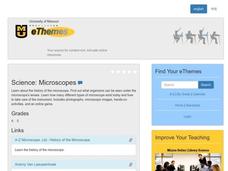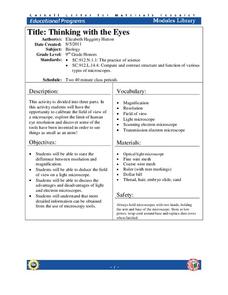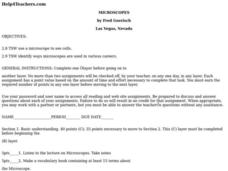Curated OER
Microscope Pictures
In this microscope worksheet, young scholars find 9 different objects from their environment, view them under a microscope, and draw what they see.
Curated OER
Microscope Mania
Students examine parts of a microscope and how to use a microscope at five lab stations. They identify parts of a microscope by describing the differences between low power and high power. They visit Internet sites (included in the...
Cornell University
Building a Compound Light Microscope
What better way to learn how to use a microscope than building your own? A lab investigation has scholars use lenses from magnifying glasses and sheets of cork to design their own compound microscopes. They calculate focal length...
Baylor College
Tools of Magnification
Life science learners need to be able to use a microscope. With this comprehensive resource, they first experience how lenses and magnification work, and then get familiar with using a compound microscope. Tremendous background...
Curated OER
Magnificent Microscopes Unit Including Mystery and Alternative Assessment Activity
After drawing and labelling a microscope, forensic science explorers use one to solve a simulated murder mystery. They examine each piece of evidence and draw what they observe at each magnification. Working in groups of four, your...
Curated OER
The Virtual Electron Microscope
Students explore the world of the very small using a Flash plug-in Virtual Electron Microscope. They complete and discuss an activity in which unknown samples are placed under the computer simulated microscope to determine where the...
Science Friday
Microorganisms on the Move
You can't b. cereus until you see this instructional activity! Young microbiologists learn to prepare deep well slides, observe two types of microorganisms, and compare and contrast their physical characteristics in this interactive and...
Curated OER
Magnificent Microscopes
Students use a microscope in a series of activities that are designed to help them explore the "invisible world" and make meaningful microscopic discoveries and learn the importance of the microscope as a tool in science and research.
Curated OER
18th Century Microscope
Young scholars examine a microscope from the 18th century. In this microscope lesson, students investigate how it works, what it was used for and how the tool has evolved through the years. Young scholars also build knowledge on how...
Curated OER
I Breath What? Activity-Pollution Detector Worksheet
In this pollution worksheet, learners collect particles using a pollution detector and then observe their results under the microscope. They calculate the average number of particles collected in three different locations. They...
Curated OER
Apple Anatomy
Students explore produce by examining an apple in class. In this microscopic food lesson, students slice an apple in a specific manner so they can fit it onto a slide and view it through a microscope. Students identify the different...
Curated OER
Animal and Plant Cell Journaling Activity
Jump into the classification of animal and plants cells, through this inviting lesson comparing Elodea leaves and Epithelial cells. Middle school learners will create wet mounts, write journal entries that compare specimens, and finally...
Curated OER
Cells: A First-Hand View
In the first of two activities, your charges prepare wet mount slides of cork and bean sprout cells in imitation of Robert Hooke's historical investigation. An excerpt from his notes is included. Then, investigators compare animal cells...
Curated OER
Time Lapse Seed Germination with the QX3 Intel Digital Microscope
Learners use the time-lapse feature of the QX3 Intel Digital Microscope
to observe germination of seeds. They use the QX3 Intel Digital microscope to create time lapse video films of seed germination experiments.
Curated OER
Underneath the Microscope
Eighth graders enhance their skills in operating a microscope. They become comfortable with the vocabulary associated with microscopes and investigate how to place slides and focus them properly using the microscope. Students are given...
Virginia Department of Education
The Cell Cycle and Mitosis
What a packed lesson! Provide your class with the opportunity to learn about the cell cycle in several exciting ways. Biologists first learn about the theory behind mitosis, then proceed to view onion tips under the microscope and create...
Curated OER
Microscopes
Students explore the history of the microscope. Find out what organisms can be seen under the microscope's lenses. explore how many different types of microscope exist today and how to take care of the instrument.
Cornell University
Plant Cell Crime Scene
Use science to solve the mystery of the Poplar murder. Pupils use forensic botany to determine if a suspect could be the killer. By analyzing images from a Transmission Electron Microscope, learners determine if the material found on the...
Cornell University
Thinking with the Eyes
Objects are larger (or smaller) than they appear! Scholars use a laboratory investigation to explore the difference between resolution and magnification. The activity allows them to calculate the size of the field of view of their light...
Nuffield Foundation
Working with Immobilized Enzymes or Microscopic Organisms
Let the lab be a catalyst to learn about enzymes. Scholars create alginate beads filled with yeast. As part of an investigation into enzymes, they see how these beads provide a catalyst to the reaction of glucose into ethanol.
Curated OER
The Microscopic World
Pupils identify magnification by first using a magnifying glass and then with photos taken through a microscope. They complete a handout that leads them through each activity stated. Finally, students use their microscope to view a...
Curated OER
Microscopes
Pupils investigate how microscopes are used. They identify ways microscopes are used to see cells and in various careers. They complete activities involving creating a vocabulary book, crossword puzzles, designing posters, and...
Curated OER
Calculations Related to the Microscope
Learners examine microscopes and how to calculate total magnification. In this calculations activity students complete an activity of calculations.
Curated OER
Plastic Bag Pond
Students investigate the pond water from a local water source. They collect the pond water from the bottom or near vegetation in order to obtain the best sample possible. Then they use microscopes in class in order to examine the life...























